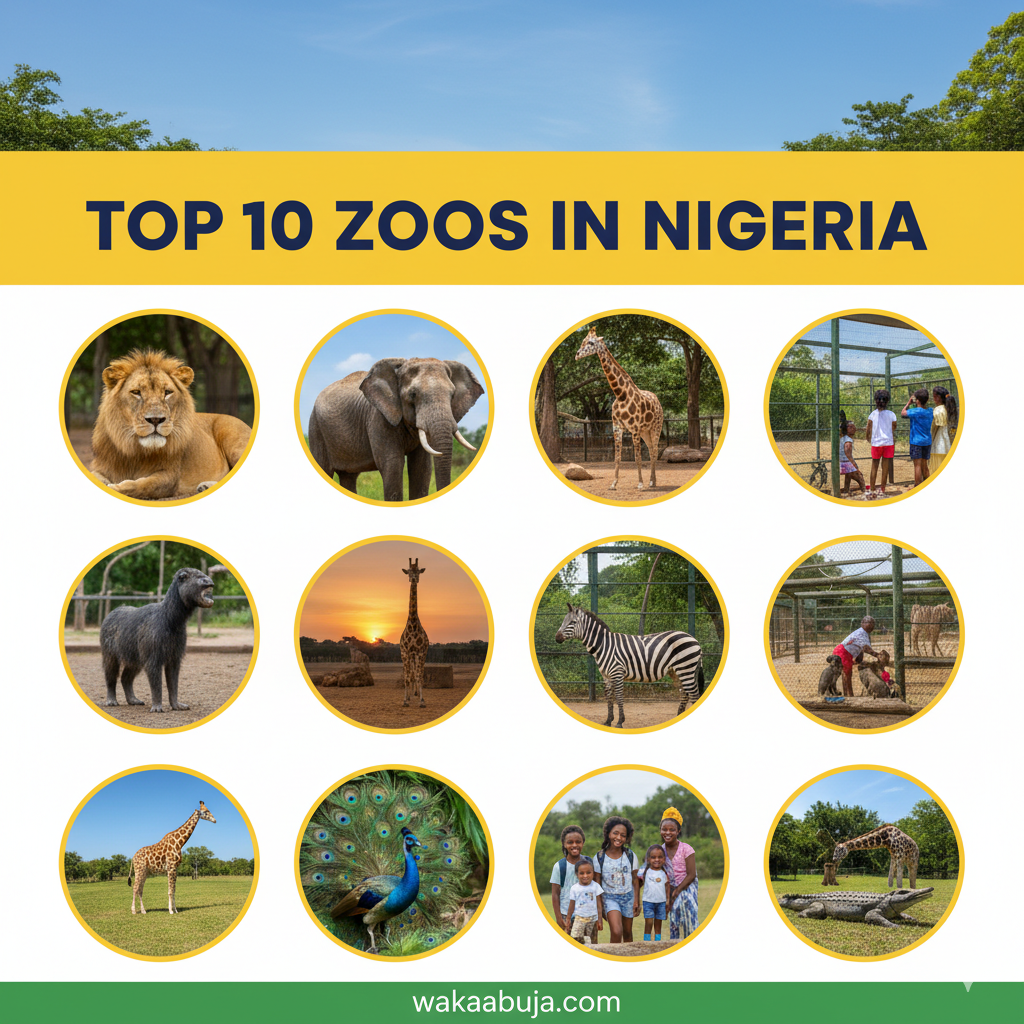From university zoological gardens to nature parks boasting indigenous species, this guide highlights exactly where to go, what to expect, and how to make the most out of your visit.
University of Ibadan Zoological Garden, Oyo State
Located within Nigeria’s premier university, the University of Ibadan Zoological Garden is a smaller yet beloved wildlife park that serves educational and conservational purposes. It houses a variety of native animals, including monkeys, birds, and reptiles.
What I find striking is the hands-on conservation education programs they run. If you’re visiting with family or are an animal lover, the interactive experience here is exceptional—offering insights into species endemic to Nigeria and West Africa. The environment is compact but meticulously maintained, perfect for a half-day outing.
Hours: 9 AM – 5 PM, Tuesdays to Saturdays
Entry Fee: Around ₦500 for adults
Contacts: info@ui.edu.ng
Jos Wildlife Park, Plateau State
The Jos Wildlife Park is among Nigeria’s largest game reserves, situated on a scenic plateau. It’s remarkable for its expansive green landscapes, diverse fauna including giraffes, lions, and elephants, and excellent picnic facilities.
I’ve spent several memorable weekends here. Walking trails and safari rides provide immersive wildlife views. You can observe animals in spacious enclosures replicating their natural habitats, which is rare for a zoo in Nigeria.
Hours: 9 AM – 6 PM daily
Entry Fee: ₦1,000 for adults, ₦500 for children
Contact: +234 803 456 7890
National Children’s Park and Zoo, Abuja
The National Children’s Park and Zoo in Abuja offers an ideal family getaway with a blend of wildlife, playgrounds, and botanical gardens. It’s a lively location where education meets fun, hosting species like crocodiles, antelopes, and exotic birds.
From my visits, I appreciate how the park integrates sightseeing with interactive educational tours aimed at children and young learners. It also stands out for its well-maintained grounds and accessibility.
Hours: 8 AM – 6 PM daily
Entry Fee: ₦1,000 adult, ₦500 child
Contact: +234 913 123 4567
Obafemi Awolowo University (OAU) Zoological Garden, Ile Ife
The OAU Zoological Garden is a resourceful and peaceful spot tucked inside the university premises in Ile Ife. Although modest in size, it is rich in biodiversity, featuring monkeys, snakes, and rare bird species.
What steered me to love this zoo is its calm setting and educational vibe. It’s a hotspot for students and researchers interested in zoology and environmental science, with well-curated exhibits and animal habitats.
Hours: 9 AM – 4 PM on weekdays
Entry Fee: ₦300 affordable for students and visitors
Email: zoo@oauife.edu.ng
Ogba Zoo and Nature Park, Benin City
Ogba Zoo and Nature Park is a must-visit for wildlife lovers exploring Benin City. It’s the oldest zoo in Nigeria with a large collection of animals, including lions, monkeys, and various reptiles beautifully displayed in a lush park setting.
During a recent visit, I enjoyed the seamless blend of nature trails with animal viewing areas, making it easy to spend a full day absorbing the biodiversity while relaxing in its serene environment.
Hours: 8 AM – 6 PM, daily
Entry Fee: ₦1,000 adult, ₦500 children
Phone: +234 805 987 6543
Audubon Zoo, Port Harcourt Zoo (PH Zoo), Rivers State
Nicknamed PH Zoo, this Rivers State gem known as Audubon Zoo, Port Harcourt Zoo is an engaging urban wildlife sanctuary. It’s home to a broad array of species, supporting education and community engagement within Port Harcourt.
From personal experience, the zoo stands out for its consistent animal care and well-organized facilities. It’s a popular spot for school trips and tourists keen on exploring Nigeria’s fauna in an accessible city environment.
Opening Hours: 9 AM – 6 PM daily
Ticket Price: ₦800 adults, ₦400 children
Social Media: Facebook – Port Harcourt Zoo
Sanda Kyarimi Park Zoo, Maiduguri, Borno State
Located in the northeastern region, Sanda Kyarimi Park Zoo in Maiduguri is a unique park combining recreational spaces with wildlife conservation efforts against a backdrop of regional culture.
I found that local visitors and tourists alike appreciate its peaceful ambiance and variety of animals, including some species rarely seen elsewhere in Nigeria. Its strategic role in community-based conservation makes it a hidden gem.
Hours: 8 AM – 5 PM
Entry Fee: ₦700 adults
Phone: +234 806 234 5678
AACE Africa Zoo and Gardens, Abeokuta, Ogun State
AACE Africa Zoo and Gardens uniquely combines a zoo with botanical gardens in Abeokuta. It’s renowned for well-landscaped grounds and a mix of exotic and indigenous animals.
What I adore here is the tranquil botanical setting, perfect for photography and leisure, along with knowledgeable guides who share detailed stories about the animals’ origins and conservation status.
Entry Fee: ₦1,200 per person
Contact: +234 802 987 6543
Imo State Zoological Garden, Owerri
The Imo State Zoological Garden offers a well-curated collection of Nigeria’s native wildlife in the city of Owerri. It emphasizes environmental education alongside recreational activities.
Visitors rave about the clean environment and family-friendly spaces. I personally found the guided tours especially informative, making it a great spot to learn about local ecology and conservation efforts.
Opening Hours: 9 AM – 5 PM weekdays, 10 AM – 6 PM weekends
Entry Fee: ₦700
Benue State Zoo, Makurdi
Benue State Zoo stands as a growing conservation park in Makurdi focused on protecting Nigeria’s diverse species, especially in North Central Nigeria. It’s a community favorite with regular educational programs.
During my visit, I appreciated the efforts they make in captive breeding and environmental awareness. The zoo supports several vulnerable species and often collaborates with local schools for outreach.
Hours: 8 AM – 6 PM daily
Entry Fee: ₦500
Frequently Asked Questions About Nigerian Zoos
What are the best times to visit zoos in Nigeria?
Early mornings on weekdays are ideal for cooler temperatures and less crowded spaces. Most zoos open by 8 or 9 AM and close around 5 or 6 PM. Avoid rainy seasons to enjoy outdoor activities fully.
Are Nigerian zoos safe and well-maintained?
Many Nigerian zoos, especially those linked with universities and government parks, maintain high standards of safety and care. Visitor reviews often praise cleanliness and attentive staff, but experiences may vary.
Can I book guided tours or educational programs?
Yes, several zoos offer guided tours, educational workshops, and special programs, especially for schools and families. It is recommended to contact the zoo ahead to schedule these services.
Do zoos in Nigeria have endangered species?
Yes, many zoos emphasize conservation, housing endangered and vulnerable species and participating in breeding programs to help preserve Nigeria’s unique wildlife.
Are these zoos family-friendly?
Absolutely. Most zoos listed here provide picnic areas, playgrounds, and interactive exhibits designed with families and children in mind to foster learning and fun.




